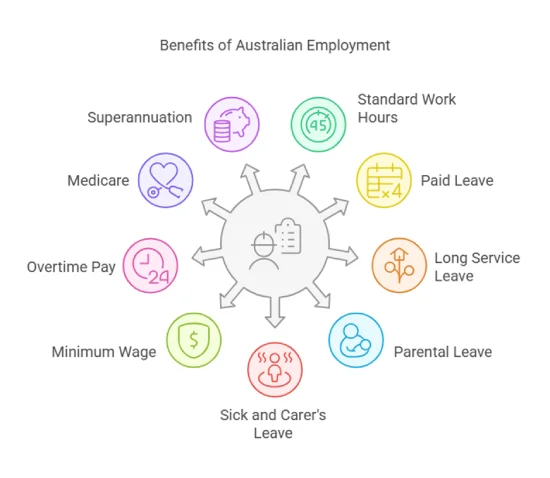Posted on March 30 2022
What are the benefits of working in Australia?
By , Editor
Updated April 17 2025
Working in Australia offers numerous benefits, such as high wage potential, a strong work-life balance, and access to a wide range of statutory and supplementary employee benefits. Australia's robust economy and generous labor laws contribute to a positive and stable work-life environment. Applicants seeking to work overseas do so to upskill themselves and improve their earnings prospects, relocate to nations where the quality of living is better than in their home, and get exposed to advanced technologies and different cultures. Before arriving at such a decision, they consider that the country they intend to work in must offer a better work-life balance and the ability to earn more.
A skilled professional who wants to work in Australia should have education, Qualifications, and work experience that they believe will add value to their workplace. Australia has a SkillSelect system that selects candidates overseas if they have the qualifications in sectors with skill shortages.
Australia will allow foreign workers as long as they have educational qualifications and work experience that they believe will add value to their workplaces. Australia Skill selects candidates from other countries if they have the qualifications in their sectors.
*Check your eligibility score to work in Australia for free through Y-Axis Australia Immigration Points Calculator.
Benefits of Australian employment
Below are some benefits of Australian employment:
- Workers in Australia need only to work for 40 hours a week
- Leave entitlements
- Receive paid leave of 30 days per year
- Long service leave
- Maternal/Paternal leave
- Sick and Carer’s leave
- Minimum wage
- Overtime
- Medicare
- Superannuation
- Worker’s compensation
- Flexible work arrangement
- Full-time and Part-time employees are eligible for 20 paid holidays
- Candidates who completed ten years are entitled to paid leaves of 8.67 weeks
- Sick pay
- Access to pension benefits
- Health Insurance
- Childcare facilities
- Flexible working conditions
- Social security benefits
- Employer Tax contributor

*Looking for jobs in Australia? Avail Y-Axis job search services to apply find the correct one for you!
Minimum Wages
The National Minimum Wage is $24.10 per hour, or $915.90 per week for a 38-hour week in Australia as of July 1, 2024. This is for employees not covered by an award or registered agreement. Employees covered by an awards or agreement have higher minimum pay rates, including penalties and allowances.
This is the adult minimum rate for employees without awards or enterprise agreements. Lower rates may apply to juniors, apprentices, and trainees. This may also apply to employees with a disability if their disability affects their productivity.
*Want assistance with Australia work visa? Talk to Y-Axis, the world’s No. 1 overseas immigration consultancy for end-to-end support.
Tags:
Benefits of working in Australia
Work in Australia
Work in Australia
Australia work visa
Australia work visa
Australia immigration
Migrate to Australia
Australia Immigration news
Jobs in Australia
Australia Visa
Australia visa
Share
Options for you by Y-Axis
Get it on your mobile
Get News alerts
Contact Y-Axis

